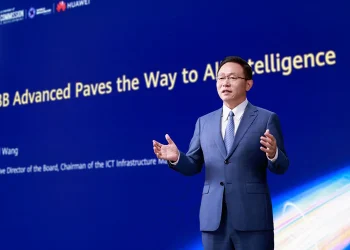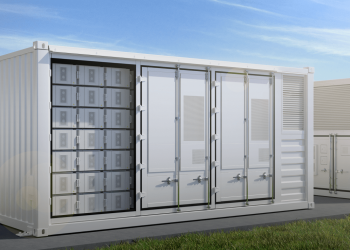In a stunning development in the global AI race, Huawei’s new AI infrastructure “CloudMatrix” has been acknowledged by NVIDIA CEO Jensen Huang as a genuine rival to the industry-leading Grace Blackwell superchip systems. The recognition signals a major shift in the balance of power in high-performance computing, particularly in China—where NVIDIA is heavily restricted by U.S. export controls.
The announcement, made in a Bloomberg interview, reflects the growing capabilities of Huawei’s AI hardware, specifically the Ascend 910C, a next-generation accelerator now said to rival NVIDIA’s H200, the most powerful chip in the Hopper series. Huang admitted Huawei is “moving very fast,” a notable statement from the leader of a company once thought to have no real challengers in AI infrastructure.
Huawei’s rise comes at a time when NVIDIA’s presence in the Chinese market is being squeezed. U.S. restrictions have blocked the export of high-end chips like the H100 and H200, forcing NVIDIA to offer scaled-back versions such as the H20 and B40. Meanwhile, Huawei has managed to engineer its solutions from scratch, without relying on U.S. intellectual property—a bold leap in semiconductor autonomy.
The CloudMatrix system, though still largely under wraps, reportedly features tight integration between the Ascend chips, the MindSpore AI framework, and a distributed cluster design that mirrors NVIDIA’s Grace Blackwell architecture. The difference? Huawei’s version is unrestricted in China and appears to be built entirely from in-house innovations.
Huang’s public admission also serves as a strategic signal. Western analysts had long believed China was at least one generation behind in AI chip development. That assumption is now outdated. Within just two years, Huawei has caught up and potentially surpassed NVIDIA in certain regional capacities—particularly in local AI data centers, which are seeing explosive growth in China.
This transformation is not only technological but also geopolitical. By blocking access to cutting-edge Western chips, the U.S. may have inadvertently spurred Huawei’s rapid advancement. With China investing heavily in AI sovereignty, Huawei’s ability to develop and deploy top-tier infrastructure without external dependencies marks a milestone in global tech competition.
While specific performance benchmarks remain scarce, insiders suggest CloudMatrix can scale horizontally like NVIDIA’s AI superclusters, possibly exceeding them in flexibility across certain deployments. As U.S. firms like NVIDIA navigate regulatory uncertainty, Huawei is positioned to dominate AI development in its home market and influence AI growth across allied nations.
Whether the West can maintain its hardware lead in this new era remains uncertain—but one thing is clear: Huawei is no longer playing catch-up. It’s competing head-to-head.https://www.youtube.com/watch?v=ay0GAiyQLNQ








